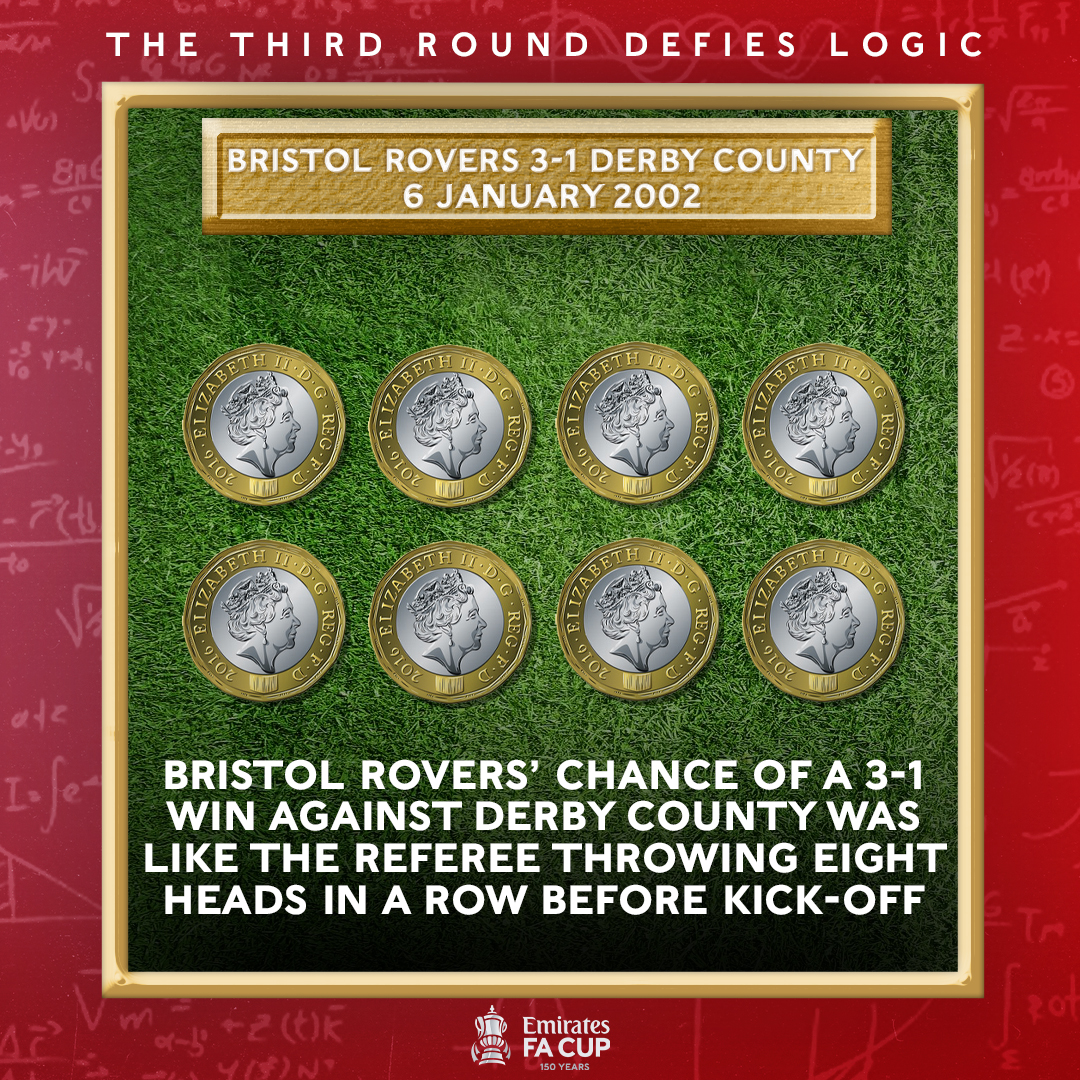Ellington heroics in 2002 make FA Cup history.
Ahead of the Third Round of this season’s Emirates FA Cup – a stage that has become synonymous with results that defy logic throughout the competition’s 150-year history – The FA has today released new mathematical research that reveals the 10 most improbable FA Cup Third Round giant-killings.
The FA teamed-up with the Institute for Mathematical Innovation at the University of Bath to commission the research that considered Opta data from more than 8,000 FA Cup ties as part of the process. Using probability theory, the University was able to verify a historical top 10 of the least likely scorelines from the last 50 years of the competition.
In order to perform their calculations, Dr Adwaye Rambojun and Professor Andreas Kyprianou from the University of Bath built a bespoke mathematical model that takes in to account the overall probability of the lower league teams reaching the Third Round, the difference in league status and the timing and sequence of the goals scored in each tie.
Goalscoring and league position trends across more than 8,000 ties from the competition since 1960 were also considered to understand how these factors historically influence the individual outcomes. The formula used in the study is expressed in the mathematical equation below:
The equation developed by the Institute for Mathematical Innovation at the University of Bath to calculate Third Round score probabilities.
The final list of results features several familiar ‘cupsets’ but now, for the very first time, the fixtures have been ranked in order of the statistical probability of each scoreline occurring.
The research has ranked Bristol Rovers much-celebrated away win against Derby in 2002 as the ninth least probable Third Round result in the last 50 years of the competition. Bristol Rovers became the first Third Division club to win an FA Cup tie against Premier League opposition away from home when they defeated Derby at Pride Park in 2002. Nathan Ellington was the hat-trick hero for Rovers, who sat 87th out of 92 league clubs at the time.
The study revealed that Woking’s 4-2 victory over West Bromwich Albion at the Hawthorns in 1991 was by far and away the least likely Third Round scoreline in the last 50 years of the competition, with just a one in 15,959,312 chance of that upset taking place. To put that into context, the result was less probable than conceiving identical quadruplets (one in 15 million probability) or winning the National Lottery’s ‘Set For Life’ top prize (one in 15,339,390).
Commenting on the research, Dr Adwaye Rambojun, Research Associate at the Institute for Mathematical Innovation at the University of Bath, said:
“Using data from over 8,000 Emirates FA Cup matches, we produced a mathematical model that takes into account not only the relative league status of the teams involved and how many matches they won to get there but also in-game scoring sequences to compute the total probability of the biggest Third Round giant-killings in the last 50 years.
"Bristol Rovers result defies logic but, as history proves, on any given day the unthinkable can happen. That’s the magic of the Emirates FA Cup and we have seen it time and again throughout the competition’s illustrious history.”
Nathan Ellington, hat-trick hero in the game against Derby, commented: “I remember sitting in the dressing room at half-time feeling absolutely baffled. The gaffer (Gary Thompson) said I was on for a hat-trick but my second wouldn’t have been mine with VAR now! Let’s just say it took a nice deflection…”
Ellington’s third, though, was a key contributing factor to the shock value, as the forward - with 135 career goals – rates it as the best strike of his career.
“I could try that 100 times in training and get it on target once,” he said. “It’s a long ball from defence, I’ve chested it down on the run between two defenders and volleyed it in past a Premier league ’keeper.”
Ellington, just 20 at the time, scored two more hat-tricks that month against Orient and Swansea to secure a move up a division to Wigan Athletic.
“It was my dream to play Premier League football and I remember being on the pitch against Derby with the likes of Fabrizio Ravanelli and they were all so technically good. We were down at the bottom of the Football League – but we did it!”
Discussing the research findings, Andy Ambler, Director of Professional Game Relations at The FA, said:
"It’s fascinating to look back at some of the Third Round games that have helped define the Emirates FA Cup and elevated it to the status of the world’s most popular domestic cup competition. The commissioned research outlines the competition’s ability to regularly defy logic and will hopefully spark many fond memories. In its 150th anniversary season, the Emirates FA Cup retains the values of hope, opportunity and equality. Improbable results are part of the competition’s fabric, providing life changing moments for players, managers, fans and communities alike and I am sure there will be plenty more to come as the competition looks ahead to an exciting future.”
More details about the forthcoming Emirates FA Cup Third Round can be found on TheFA.com.
